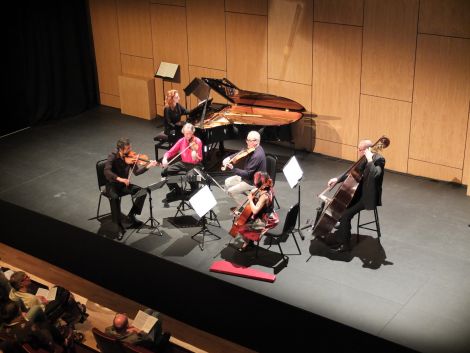Reviews / Review: ‘magnificent’ ensemble’s risk pays off
It can’t be easy to plan a classical concert. Play it too safe, and the performance might fail to be memorable; make it too ‘out there’, and you risk alienating the audience.
Mr McFall’s Chamber took a risk with a programme of relatively modern Baltic tunes and Finnish Tango when they took to the stage at Mareel in Lerwick on Saturday: one that was well worth it.
Yes, Finnish Tango. “You may be surprised that such a thing exists,” said the ensemble’s eponymous founder Robert McFall, as he introduced the first piece. Mr McFall’s Chamber is renowned for accessible and daring performances, and it seemed that this concert, Solitudes, would be no exception.
That first piece was the fascinating Introduction and Tango Overture by Aulis Sallinen. The Introduction was a masterpiece of pizzicato-filled tension that would be a great soundtrack to a black and white film noir, with the piano and strings continually swapping dominance, playing more in combat than concert. The Tango Overture was more recognisably tango, but no less suspenseful; a dark, sumptuous piece that alternated between frantic urgency and cautious restraint.
Following swiftly was Bangos by Lithuanian composer Zita Bružaitė, a hypnotic solo piano piece. Guest pianist Maria Martinova’s hands fluttered across the keys from start to finish, producing a cascade of notes more reminiscent of a harp than a piano. The music was as fixating as it was beautiful, a captivating barrage of music that stopped suddenly – jarringly – and brought a mesmerised audience crashing out of its reverie.
Lamento (for two violas) by Finnish composer Kalevi Aho was written, according to Mr McFall, in memory of one of Aho’s friends. An understandably sad tone underpinned this unusual piece; the two violas seemed to be playing completely different compositions, only occasionally meeting each other for a moment, before each doing their own thing again.
Become a member of Shetland News
Mr McFall explained that Estonian composer Erkki-Sven Tüür had, in his earlier career, been a prog-rocker “when such things were frowned upon by the authorities there.” It seemed reasonable to expect that his cello-and-piano piece, Dedication, be a little bit unorthodox.
Dedication was a sinister, eerie number, with a repeated use of a long, murmuring note on the cello, left hanging and fading to nothing, the silence suddenly then broken by the screech of something being dragged up the piano string like a scare chord in a horror film. Dedication was gripping, with a wonderful use of slow, tense fades to silence.
Olli Mustonen’s Toccata rounded off the first half; deep, heavy stringwork accompanied by violent crashing piano. It was a perfect end-point; a big finish that garnered big applause.
Two works by minimalist Estonian composer Arvo Pärt began the second half. The first, Fratres, was an ecclesiastical-sounding piece, and heavily influenced by Pärt’s period of living in a monastery. It utilised his signature ‘tintinnabuli’ technique, which is supposed to invoke the sound of a bell ringing after being struck, achieving a quasi-medieval sound through the de-tuning of the violin and viola.
The second, Für Alina, was an intriguingly restrained solo piano piece, making as much use of the space between the notes as the notes themselves. The lack of chords and the relative sparseness of the notes lent an effective melancholy, ending on a long, contemplative silence.
The extremely interesting A Little Summer Music by Latvian composer Pēteris Vasks was described as having “the atmosphere of being alone on a summer’s day.” The piece darted from a weeping sadness to a sprightly pastoral, like musical moodswings, compressing a huge amount of feeling into a very short space.
Le Grand Tango, by Astor Piazolla, was a true highlight. A dramatic, passionate and hot-blooded affair for piano and violin, Le Grand Tango was an absolute joy. Guest violinist Cyril Garac’s playing was flawless and dizzying, a whirlwind of notes that spun the room and ended in a wild flourish – an absolute triumph.
Three Finnish pieces rounded off the concert – two tangos and some theatrical score. The spellcheck-straining Täysikuu (by Toivo Kärki) and Satumaa (by Unto Mononen) were just as stirring as Le Grand Tango but noticeably lighter and less intoxicating. Jean Sibelius’ Einsames Lied, an extract of incidental music from a production of Belshazzar’s Feast, was a wonderfully thoughtful bit of music, evoking solitude but not sadness.
The ensemble barely made it off the stage before being summoned back by the wild applause for the encore. “Would you like to hear Sibelius’ Finlandia played on a saw?” Mr McFall asked the audience. Too right they did.
Su-a Lee dutifully produced a really big saw (which, delightfully, had its own instrument case) and absolutely stole the show by playing it better than many professional musicians play actual instruments. The ethereal, theremin-like sound actually complemented Finlandia extremely well, ending the concert on a fun, memorable note.
Solitudes was a risk from the outset, but 100 per cent worth it. A magnificent, charming performance of wonderful compositions, played to perfection, that left the audience with a spring in their steps and smiles on their faces.
Alex Garrick-Wright
Become a member of Shetland News
Shetland News is asking its readers to consider paying for membership to get additional perks:
- Removal of third-party ads;
- Bookmark posts to read later;
- Exclusive curated weekly newsletter;
- Hide membership messages;
- Comments open for discussion.
If you appreciate what we do and feel strongly about impartial local journalism, then please become a member of Shetland News by either making a single payment, or setting up a monthly, quarterly or yearly subscription.





























































